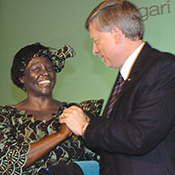Pitt Dedicates Trees, Garden in Honor of Wangari Maathai
Fifty summers ago, a student came to the University of Pittsburgh to take a course on leadership that put her on a path to an eventual Nobel Prize. For a class assignment, she wrote a paper about how the development of a nation could be fostered through helping rural women work together. That idea ultimately led the Pitt student, Wangari Maathai, to win the Nobel Peace Prize in 2004, making her the first environmentalist and African woman to receive the honor.
Maathai earned a master’s degree in biology from Pitt in 1965  and, after spending several years studying abroad, she returned to her native Kenya to find a deforested landscape that was threatening the local ecology as well as the livelihoods of farmers. She started a simple tree-planting project that paid rural women for each tree they planted and kept alive. The project came to be known as the Green Belt Movement, which resulted in the planting of more than 51 million trees. Maathai’s movement also brought Kenyan citizens together to advocate for sustainable development, social justice, and democracy. Maathai died in 2011, but her Green Belt Movement continues to plant trees and advocate for a better world.
and, after spending several years studying abroad, she returned to her native Kenya to find a deforested landscape that was threatening the local ecology as well as the livelihoods of farmers. She started a simple tree-planting project that paid rural women for each tree they planted and kept alive. The project came to be known as the Green Belt Movement, which resulted in the planting of more than 51 million trees. Maathai’s movement also brought Kenyan citizens together to advocate for sustainable development, social justice, and democracy. Maathai died in 2011, but her Green Belt Movement continues to plant trees and advocate for a better world.
To honor her legacy, the Wangari Maathai Trees and Garden has been planted on the Cathedral of Learning’s lawn at the Pitt campus. Pitt Chancellor Mark A. Nordenberg will dedicate the garden at 4:30 p.m. Sept. 25 by unveiling a memorial plaque at the garden. The garden is located near the Fifth Avenue entrance of the Cathedral of Learning, 4200 Fifth Ave., Oakland. The dedication ceremony, held during Pitt’s Homecoming week, is open to the public.
“Professor Maathai’s lifelong commitment to advocating for women, the poor, and the oppressed, especially through her founding of the Green Belt Movement, has had a truly global impact, bringing hope and opportunity for a better life to countless women. In light of these accomplishments, coupled with the honor that she has brought to the University as one of our outstanding alumnae, it is only right that we pay tribute to her life and accomplishments through the creation of a living monument here at the University,” Nordenberg said. “The new Wangari Maathai Garden and Trees reflects the pride we take in claiming Wangari Maathai as one of our distinguished graduates and it will serve as an ongoing inspiration to generations of Pitt students to come, reminding them of the positive difference that one person, armed with an education and a dream, can make.”
The Wangari Maathai Trees and Garden includes two red maples that symbolize Maathai’s commitment to the environment, her founding of the Green Belt Movement, and her roots in Kenya and in Pittsburgh. A flower garden between the trees features seasonal blooms planted in a circular shape, representing Maathai’s global vision and dedication to the women and children of the world. A petit ornamental maple tree in the middle of the circular flower garden signifies how one small seed can change the world.
The Wangari Maathai Trees and Garden is positioned across the street from Alumni Hall, where Maathai received an honorary degree from Chancellor Nordenberg and delivered a lecture to the Pitt community on Oct. 26, 2006. “I feel as though I am back home,” she said during her lecture. “I am deeply grateful for the gift that this institution gave me. I felt I was prepared to go forth, ready to serve the world.”
Maathai’s memoir, Unbowed (Knopf), was released the same year as her 2006 lecture. The book chronicles her travels to the United States to earn university degrees, including mention of the paper she wrote in that Pitt leadership course. “Little did I know that I would be putting that theory into practice only a decade later, when I would be inspired by rural women to initiate the Green Belt Movement,” she wrote.
In her memoir, Maathai also recalled her leadership as the first female chair of the University of Nairobi’s Department of Animal Physiology and a member of the National Council of Women. And she demonstrated that planting trees wasn’t easy. Maathai campaigned loudly against deforestation, even being arrested and beaten by police at protests. She led hunger strikes. She addressed the United Nations about her concerns, eventually serving on the U.N.’s Commission for Global Governance and the Commission on the Future.
In 2002, Maathai was elected to Kenya’s Parliament, where she voiced support for environmental conservation, equality, and democracy. After receiving the Nobel Prize in 2004 for “her contribution to sustainable development, democracy, and peace,” she continued to champion the causes of the Green Belt Movement, through her role as the presiding officer of the Economic, Social and Cultural Council of the African Union, as well as through lectures at universities worldwide.
Visit www.greenbeltmovement.org to learn more about Maathai’s Green Belt Movement.
Other Stories From This Issue
On the Freedom Road

Follow a group of Pitt students on the Returning to the Roots of Civil Rights bus tour, a nine-day, 2,300-mile journey crisscrossing five states.
Day 1: The Awakening
Day 2: Deep Impressions
Day 3: Music, Montgomery, and More
Day 4: Looking Back, Looking Forward
Day 5: Learning to Remember
Day 6: The Mountaintop
Day 7: Slavery and Beyond
Day 8: Lessons to Bring Home
Day 9: Final Lessons

